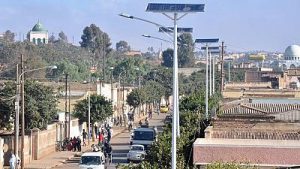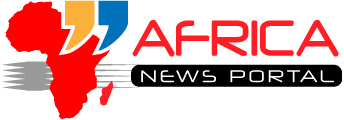Asmara, the capital of Eritrea has started using solar energy to power street lights. Under the first phase of a plan to ensure street lights rely on solar energy, 10 kilometers of road have so far been connected, informed Yemane Ghebre Meskel, Eritrea’s Minister of Information. The main areas in Asmar using solar street lights for this phase were main arteries and populated suburbs of Asmara like Idaga Arbi, Akhria, Idaga Hamus and Modeshto.

Asmara has started using solar energy to light up its streets
Asmara has recently been declared as a world heritage site by UNESCO. UNESCO described Asmara as a ‘modernist city of Africa.’ Across the African continent, solar energy is seen as an expensive option by many governments. The power mix in Africa largely depends on hydroelectric and thermal options. The most recent talk of solar energy was in Ghana where the Energy Minister said the presidency and parliament were soon going to depend fully on solar energy.
“It makes a lot of sense that in order to utilize our solar and produce the necessary demonstration effect for the rest of the country, that significant buildings adopt solar. “So the Ministry of energy building, the Parliament House of Ghana and Jubilee House (presidency) must all go solar to send the right signal to the rest of the nation that the government is behind it and that is the proper thing to do,” Boakye Agyarko is quoted to have said.
Electricity supply in Africa is in a very sorry state. Millions of Africans now have mobile phones with no electricity to charge batteries.
In many countries on the continent, less than 20 percent of the population have access to electricity; the situation is much worse in rural areas where fewer than 5 percent are connected to the grid.
With an average of 325 days of bright sunlight every year, solar power remains one of Africa’s most abundant but scarcely used resources. Entrepreneurs like Tanzania’s Patrick Ngowi are already making millions from this huge gap between electricity demand and supply.
All the 48 countries of Sub-saharan Africa (with a combined population of more than 750 million people) generate roughly the same amount of power as Spain (a single country of less than 50 million people).
Africa has arguably the worst electric power infrastructure in the world with the lowest scores in power generation, consumption and security of supply.
Patrick Ngowi, a 28-year old solar entrepreneur and CEO of Helvetic Solar Contractors based in Tanzania has installed roughly 6,000 small home solar systems, and worked on several government and NGO solar projects across East Africa.
His company’s $15 million annual revenue proves that unlocking the value in the solar energy market lies in the hands of those who can put smiles on customers’ faces by getting the job done!















